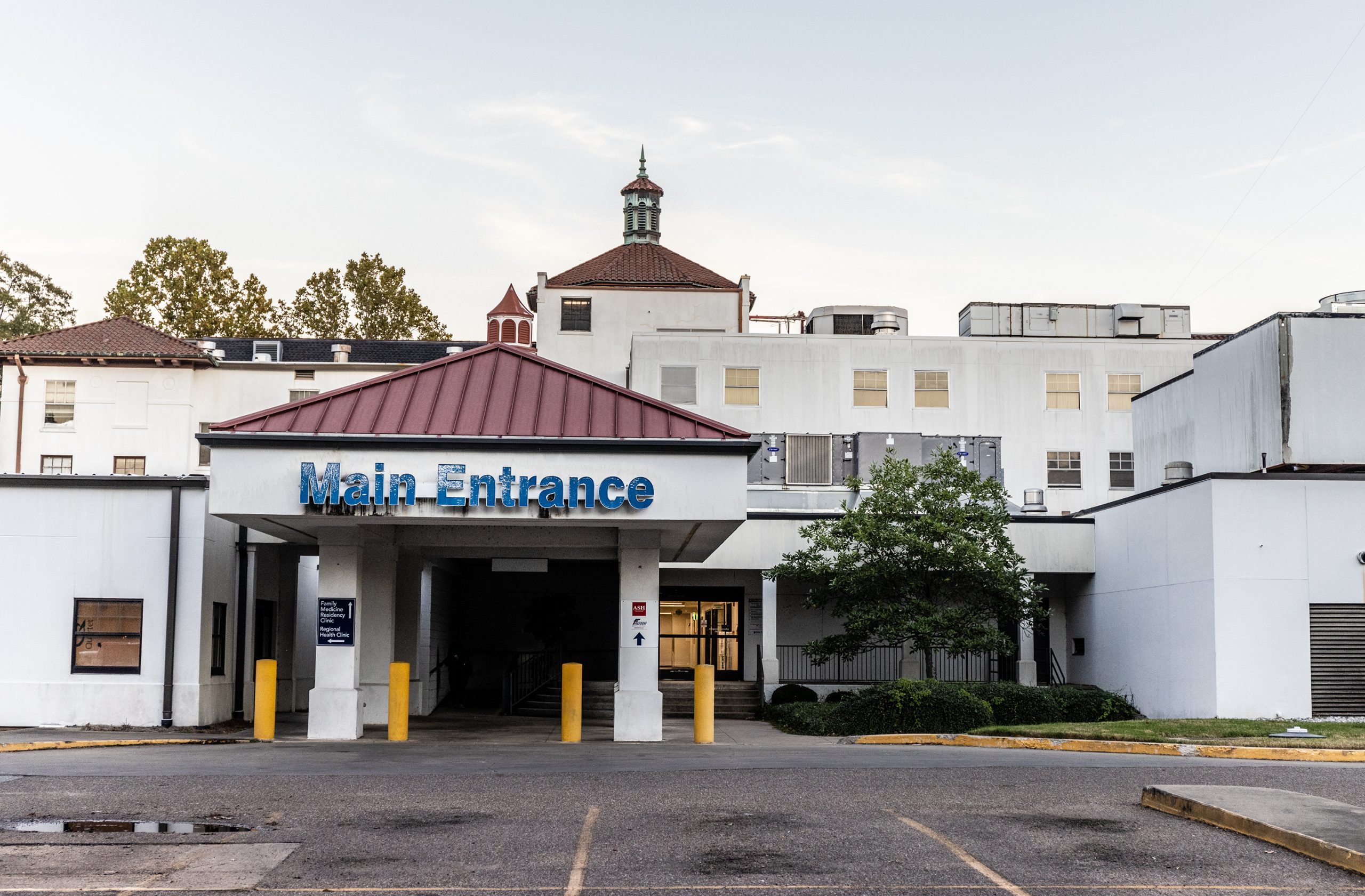Mississippi Today
‘Slightly more breathing room’: Fewer rural hospitals at risk of closure, but threat still looms

‘Slightly more breathing room': Fewer rural hospitals at risk of closure, but threat still looms
A newly updated report shows that fewer Mississippi rural hospitals are at near-term or immediate risk of closure than they were three months ago.
But the leader of the Center for Healthcare Quality and Payment Reform, the organization behind the report, warns that Mississippi is by no means out of the danger zone.
The October version of the report, which the organization releases every three months, said that over half, or 38, of Mississippi's 70 rural hospitals were at risk of closing. Of those, 24 were at risk of closing imminently .
New data from mid-January shows that now, 38% are at risk of closing. Of the 28 rural hospitals at risk of closing, 19 are at risk of shuttering immediately, putting the state fourth in the nation for percentage of rural hospitals at immediate risk of closure.
Currently, the center reports there are 74 rural hospitals in Mississippi. Miller said the number changed from 70 to 74because the federal classification of “rural” hospitals has changed since last year, and the organization's report previously did not include hospitals for which they did not have data.
The updated report also features new data points, including the amount of rural hospitals losing money taking care of patients, which is about two-thirds.
The center assesses how imminent the threat of closure is by estimating how long hospitals can maintain operations while losing money on patient services. Hospitals are deemed at risk of closing when they can only sustain losses for six to seven years, and at immediate risk when their assets can offset those losses for only two to three years.
Harold Miller, the president and CEO of the national policy center, said the numbers show a slight change in a state with many hospitals at-risk.
“I wouldn't take it as an improvement,” he said. “At most, I would say it might suggest that there is slightly more breathing room than you might have thought, but there still isn't much.”
Mississippi State Health Officer Dr. Dan Edney agreed: “Yes, we've gone from alarming to just plain bad,” he wrote on Twitter.
Neither the Mississippi Hospital Association nor the Mississippi Rural Hospital Association responded to requests for comment by the time of publication.
Rural hospitals are essential to their communities. Their closures often mean a total loss of health care and more pressure on nearby hospitals in a state with some of the worst health outcomes in the country.
“The number could go up again,” Miller said. “I don't think you can interpret that there's some great trend of improvement going on. The important thing is not the exact number that's at risk, but the fact that you have a lot of hospitals that are losing money and don't have the assets to cover them.”
Miller said the numbers in the report, which is updated with new data quarterly, can vary dramatically from year to year. During the pandemic, hospitals received temporary federal grants to offset losses. Others might have taken out loans, he said. Some might have been forced to eliminate an essential service.
While that might stabilize the hospital's financial status, it's a loss for the community.
Greenwood Leflore Hospital, for example, recently shuttered its labor and delivery unit, primary care clinic and reduced other services. Delta Health-The Medical Center in Greenville also closed its neonatal intensive care unit and cardiac rehabilitation department last year.
And while it appears slightly fewer hospitals are at risk of closing, they're still not profitable. The number going down doesn't mean fewer hospitals are having problems — it means they might be able to stay open longer than the previous estimate suggested, Miller said.
“They might have net assets available, and that will keep them afloat for a while,” he said. “In other words, they can lose money because there's money in the bank. But sooner or later, when the losses continue and the money in the bank runs out, they're technically bankrupt.”
Studies have shown that Medicaid expansion would allow millions to flow to struggling hospitals and create thousands of jobs, but Miller said while it might provide some relief, it's not the only solution. Miller, whose organization advocates for payment reform, said the medical payment system is flawed and hospitals are underpaid by commercial insurers.
Despite the lower number of hospitals at risk of closure in Mississippi, the report should still incite concern, he said. Its purpose is to draw attention to the problem before it gets worse.
“Once a hospital closes it is very difficult, if not impossible, to reopen it,” he said. “And you don't suddenly wait until the hospital is going to close and say, ‘Let's find a solution.'”
“Mississippi needs to be doing things now to try to help make sure that these hospitals don't close.”
This article first appeared on Mississippi Today and is republished here under a Creative Commons license.
Mississippi Today
North Mississippi business leaders urge Legislature to pass Medicaid expansion
A group of business leaders from northeast Mississippi, one of the most conservative areas of the state, recently wrote a letter to House Speaker Jason White encouraging lawmakers to expand Medicaid coverage to the working poor.
The letter, signed by influential Itawamba County business owner and Republican donor Luke Mongtomery, thanked White for pressing forward with Medicaid expansion legislation and called it “the most important legislative issue for the 2024 session.”
“As this bill now goes to our legislators appointed to the conference committee for consideration, I have faith that a workable solution will be developed that is agreeable among House and Senate leaders,” Montgomery wrote. “Legislation that is good for our future and for all Mississippians.”
Montgomery wrote the letter on behalf of Mississippi Hills Leadership PAC, a committee of north Mississippi business leaders who regularly donate to statewide politicians and dozens of conservative legislative candidates.
Montgomery is the current chairman of the PAC, while Dan Rollins, CEO of Tupelo-based Cadence Bank, serves as the vice vice chairman and David Rumbarger, CEO of Lee County's Community Development Foundation, serves as its treasurer.
The PAC last year donated $50,000 to White's campaign, $50,000 to a PAC White controls, $50,000 to Hosemann and thousands of dollars to lawmakers, according to campaign finance reports with the secretary of state's office.
Business and civic leaders in northeast Mississippi such as Jack Reed Sr., George McLean, Hassell Franklin and Bobby Martin, all of whom have since passed away, had a longstanding history of advocating for political causes in the region.
But in modern times, business leaders from the area are careful to wade into political issues beyond the typical scope of local business interests.
Montgomery told Mississippi Today in a statement that the PAC's leaders support White, a Republican from West, and Hosemann, the leader of the Senate, for realizing the importance of passing expansion legislation.
“The Mississippi Hills Leadership PAC fully supports our House and Senate leaders as they work together to develop a responsible healthcare expansion plan that takes full advantage of available federal support for the benefit of our hospitals, our people, and our future,” Montgomery said.
The letter comes in the middle of House and Senate leaders attempting to hammer out a compromise in a conference committee to resolve the different expansion plans the chambers have proposed.
The House's expansion plan aims to expand health care coverage to upwards of 200,000 Mississippians, and accept $1 billion a year in federal money to cover it, as most other states have done.
The Senate, on the other hand, wants a more restrictive program, to expand Medicaid to cover around 40,000 people, turn down the federal money, and require proof that recipients are working at least 30 hours a week.
Montgomery's letter did not endorse a specific plan, but it did call the House's plan, which expanded coverage to the full 138% of the federal poverty level under the Affordable Care Act, “a reasonable and responsible proposal.”
A potential compromise is for the two chambers to agree on a “MarketPlus Hybrid Plan,” which health policy experts with the Center for Mississippi Health Policy and the Hilltop Institute at the University of Maryland, Baltimore County estimate could save the state money in the long-term.
Speaker White previously told Mississippi Today in an interview that he believes he can hold a bipartisan group of more than 90 House members, a veto-proof majority, together in support of a compromise expansion package.
But the coalition of support in the 52-member Senate is more fragile. The Capitol's upper chamber only passed its austere expansion plan by 36 votes, with only one vote to spare for the two-thirds threshold needed to override a governor's veto.
In addition to Hosemann, the PAC has donated money to the following senators: Kathy Chism, R-New Albany; Rita Potts Parks, R-Corinth; Daniel Sparks, R-Belmont; Chad McMahan, R-Guntown; Hob Bryan, D-Amory; Ben Suber, R-Bruce; Dean Kirby, R-Pearl; Briggs Hopson, R-Vicksburg and Josh Harkins, R-Flowood.
Jack Reed Jr., the former Republican mayor of Tupelo and the CEO of Reed's Department Store, an economic anchor of downtown Tupelo, is also expected to be at the Capitol on Tuesday morning to advocate for expansion.
This article first appeared on Mississippi Today and is republished here under a Creative Commons license.
Mississippi Today
On this day in 1892


April 22, 1892

Fiery civil rights pioneer Vernon Johns was born in Darlington Heights, Virginia, in Prince Edward County. He taught himself German and other languages so well that when the dean of Oberlin College handed him a book of German scripture, Johns easily passed, won admission and became the top student at Oberlin College.
In 1948, the Dexter Avenue Baptist Church in Montgomery, Alabama, hired Johns, who mesmerized the crowd with his photographic memory of scripture. But he butted heads with the middle-class congregation when he chastised members for disliking muddy manual labor, selling cabbages, hams and watermelons on the streets near the state capitol.
He pressed civil rights issues, helping Black rape victims bring their cases to authorities, ordering a meal from a white restaurant and refusing to sit in the back of a bus. No one in the congregation followed his lead, and turmoil continued to rise between the pastor and his parishioners.
In May 1953, he resigned, returning to his family farm. His successor? A young preacher named Martin Luther King Jr.
James Earl Jones portrayed the eccentric pastor in the 1994 TV film, “Road to Freedom: The Vernon Johns Story,” and historian Taylor Branch profiled Johns in his Pulitzer-winning “Parting the Waters; America in the King Years 1954-63.”
This article first appeared on Mississippi Today and is republished here under a Creative Commons license.
Did you miss our previous article…
https://www.biloxinewsevents.com/?p=351711
Mississippi Today
Podcast: Rep. Sam Creekmore says Legislature is making progress on public health, mental health reforms

House Public Health Chairman Sam Creekmore, R-New Albany, tells Mississippi Today's Geoff Pender and Taylor Vance he's hopeful he and other negotiators can strike a deal on Medicaid expansion to address dire issues in the unhealthiest state.
This article first appeared on Mississippi Today and is republished here under a Creative Commons license.
Did you miss our previous article…
https://www.biloxinewsevents.com/?p=351583
-
SuperTalk FM6 days ago
Chance of parole denied for man who killed 3 Choctaw Indian tribal members
-
SuperTalk FM6 days ago
2 arrested after missing man’s body found on side of Mississippi highway
-
Mississippi News5 days ago
What this means for local schools
-
228Sports2 days ago
From Heartbreak to Hoop Dreams: Pascagoula Panthers Springboard from Semifinal Setback to College Courts
-
Kaiser Health News6 days ago
To Stop Fentanyl Deaths in Philadelphia, Knocking on Doors and Handing Out Overdose Kits
-
Mississippi News2 days ago
2 dead, 6 hurt in shooting at Memphis, Tennessee block party: police
-
Mississippi News5 days ago
Willis Miller sentenced to 45 years in prison, mandatory
-
Mississippi Today5 days ago
The unlikely Mississippi politician who could tank Medicaid expansion





































